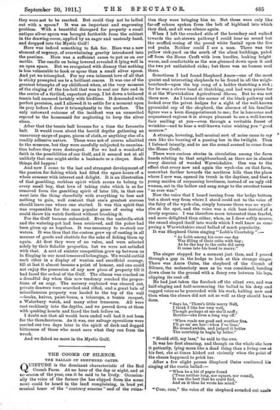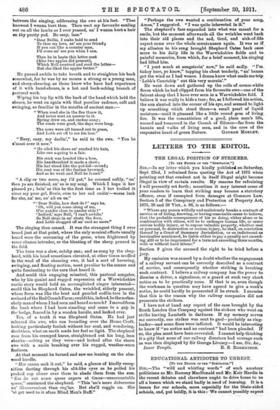THE COOMB OF SILENCE.
THE BALLAD OF SHEPHERD OATES.
QUIETUDE is the dominant characteristic of the Red Coomb Farm. At no hour of the day or night, and at no season of the year, can it be said to be lively. Occasion- ally the voice of the farmer (he has slipped from the scene now) could be heard in the land complaining, in loud yet musical toner of the "contrary seasons " and of the ruina-
tion they were bringing him to. But these were only like far-off echoes spoken from the belt of highland into which they died, and all was silence again.
When I left the crooked stile of the boundary and walked
towards the ash-strewn pathway I could hear no sound but the muffled cooing of the proud white fantail upon the five red peaks. Neither could I see a man. There was the yellow rick-yard on the south of the silent buildings, paled off from the Home Croft with iron hurdles, looking bright warm, and comfortable as the sun gleamed down upon it and the two yet unthatched ricks ; but there was no human soul there.
Sometimes I had found Shepherd Amos—one of the most quaint and interesting shepherds to be found in all the neigh- bourhood—upon the top rung of a ladder thatching a rick ; for he was a clever hand at thatching, and had won prizes for
it at the Warwickshire Agricultural Shows. But he was not there now. As I turned the corner of the black pathway and looked over the privet hedges for a sight of the well-known pyramidal cap of the shepherd, the absence of his familiar figure was a keen disappointment to me ; for in lonesome and sequestered regions it is always pleasant to see a well-known face smiling at you—even through a veritable forest of wrinkles—and to hear a well-known voice wishing you " good morrow."
A strange, hovering, half-musical sort of noise came to my • ears like the buzzing of a passing bee in the twilight. Then
I listened intently, and to me the sound seemed to come from the Home Croft.
There were curious stories in circulation among the farm hands relating to that neighbourhood, as there are in almost every district of wooded Warwickshire. One was to the effect that every now and again the wych-elm on that farm, somewhat farther towards the northern hills than the place where I now was, opened its trunk in the daytime, and that a young maiden of surpassing loveliness, instead of an ugly old woman, sat in the hollow and sang songs to the sweetest tunes " as ever was."
Now the voice that I heard issuing from the hedge bottom but a short way from where I stood could not be the voice of the fairy of the wych-elm, simply because there was no wych- elm at the spot, and the voice was a rich bass instead of a lovely soprano. I was therefore more interested than fearful, and more delighted than either, when, as I drew softly nearer, the sound shaped itself into words which I well knew as com- posing a Warwickshire rural ballad of much popularity.
It was Shepherd Oates singing " Lobb's Courtship ":— " As Lobb among his cows one day Was filling of their cribs with hay ; As he the hay to the cribs did carry It came into his head to marry."
The singer stopped for a moment just then, and I peered through a gap in the hedge to look at this strange singer. There was Amos Oates, the shepherd of the Coomb of Silence, the melancholy man as he was considered, bending down close to the ground with a fleecy ewe between his legs, clipping its coat off.
He had just taken the forelock off the silent ewe, and was half-singing and half-murmuring the ballad in his deep and rugged voice as he proceeded with his work, halting now and then when the shears did not act so well as they should have done. " Says he, 'There's little merry Nell, I think I like her very well, Though perhaps at me she'll scoff ; Besides—she lives a long way off.'
`When roads are good and weather fine, I'll go an' see her—when I've time.' He mused awhile, and judged it better The courtship to begin by letter."
" Hould still, my lass," he said to the ewe.
It was her first shearing, and though on the whole she bore it patiently, lying more like a dead thing than a living one at his feet, she at times kicked out violently when the point of the shears happened to prick her.
After a few slight pauses Shepherd Oates continued his singing of the rustic ballad:—
"When he a bit of paper found ('Twas neither long, nor square, nor round), It was the best that he could find, And on it thus he wrote his mind."
" Cum, cum," the voice of the shepherd sounded out again
between the singing, addressing the ewe at his feet. "Thee knowest I wunna hurt thee. Thou west my favourite eanling out on all the lambs as I over peened, an' I wunna hurt a hair on thy pretty yed. Be easy, lass."
"Dear Nellie, I make bold to send To thee my love, an' am your friend; If you can like a country man, I'll come an' see you when I can, Then he in haste this letter sent (Also two apples did present),
Which Nell received and read the letter—
But she liked the apples better."
He paused awhile to take breath and to straighten his back somewhat, for he was by no means a strong or a young man, and sheep-shearing, as those know who have bad experience of it with hand-shears, is a hot and back-aching branch of past oral work.
Wiping his top lip with the back of the hand which held the shears, he went on again with that peculiar cadence, soft and swinging, so familiar in the mouths of ancient men ;— " When read she in the fire threw it, And never sent an answer to it.
Spring drew on, and cuckoo sung ; The roads were good, the days were long.
The cows were all turned out to grass, And Lobb set off to see his lass."
" Easy, easy, my darlin'," he said to the ewe. " You be a'most over it now."
" He oiled his shoes an' combed his hair, Like one a-going to a fair.
His stick was bended like a bow, His handkerchief it made a show; His hat stood like the pot-lid—round; His coat was of the fustian browned, And so he -went and Nell he found?'
"A clip or two more, my l'il pet," he crooned softly, "an' then ye are finished, an' so is my song. Which I hope it hey pleased ye ; bein' as this be the first time as I hey trolled iti since my poor gel, Rosie, cum to her sad endin'—worse luck for she, an' me, an' all on us."
"'Dear Nellie, how dost do P' says he. Oh, will you come along of me, O'er yander close to yander stile ? '
' Indeed,' says Nell, 'I can't awhile! So Nell steps in an' shuts the door, And Lobb shogged off an' said no more."
The singing then ceased. It was the strangest thing I ever beard just at that point, where the only musical effects usually heard were the screaming of the geese, when frightened by some chance intruder, or the bleating of the sheep penned in the fold.
The tune was a slow, catchy one; and as sung by the shep- herd, with his head sometimes elevated, at other times muffled
in the wool of the shearing ewe, it had a sort of hovering, swinging, and floating motion, most peculiar to the senses and quite fascinating to the ears that heard it.
And could this engaging minstrel, this pastoral songster, who by his quaint and rugged expression of a Warwickshire rustic story would hold an accomplished singer interested— could this be Shepherd Oates, the wrinkled, elderly peasant, whose form was like the bent and gnarled codlin-tree in the orchard of the Red Coomb Farm; could this, indeed, be the mela n- choly man of whom I had seen and heard so much? I moved f rom the bush where I had been standing and came to a gap in the hedge, fenced in by a wooden hurdle, and looked over. Yes, of a truth it was Shepherd Oates. He had just released the ewe, who ran bounding over the Home Croft, looking particularly foolish without her coat, and wondering, doubtless, what on earth made her feel so light. The shepherd rose from his cramped knees, straightened out his long, lean shanks—aching as they were—and looked after the shorn ewe with a smile breaking over his rugged, weather-worn features.
At that moment he turned and saw me leaning on the elm- wood hurdle.
" Her canna mek it out," he said, a glance of kindly recog- nition darting through his slit-like eyes as he pulled his peaked cap closer over them to shade them from the sun. Em do cut some queer capers at times—unaccountable queer," continued the shepherd. " This 'un's more dubersome an ill-convenient than reg'lar. But she'll niggle on. She 'ul get used to it afore Blind Man's Buff." "Perhaps the ewe wanted a continuation of your song, Amos," I suggested. "I was quite interested in it."
The shepherd's face expanded into what was meant for a smile, but the moment afterwards all the wrinkles went back into their old places and the sad, tired, and sick-of-life aspect came over the whole countenance again. It was as if my allusion to his song brought Shepherd Oates back once more to his daily life in the Warwickshire fields and to painful memories, from which, for a brief moment, his singing had lifted him.
"I yeast much at songaterin' now," he said sadly. "
tiskey here, ye know," tapping his chest tenderly, "an' hanna got the wind as I had wunce. I donna know what made me trip. ' Lobb's Courtship' out this very mornin'."
He went down and gathered up the rolls of cream-white fleece which he had clipped from his favourite ewe—one of the fairest sheep that I have ever seen in a Warwickshire fold. I believe it was really to hide a tear; for, as I followed his action, the sun slanted into the corner of his eye, and seemed to light up something which stood there—a small pearl of liquid moisture—until it gleamed like a little round gem of living, fire. It was the romanticism of a good, plain man's life, nursed and treasured in the Comb of Silence—far from the haunts and v. arks of living men, and in the core of the responsive heart of green Nature. GEORGE MORLEY.











































 Previous page
Previous page